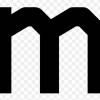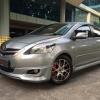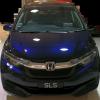Search the Community
Showing results for tags 'coke'.
-
Coca-Cola announces its first-ever alcoholic drink 3:50 PM ET Wed, 7 March 2018 | 01:22 Coca-Cola is launching the first alcoholic drink in its history with a canned liquor product in Japan. The drinks giant will experiment with a canned beverage called Chu-Hi, made up of distilled Japanese drink shochu, sparkling water and flavoring. "This is unique in our history. Coca-Cola has always focused entirely on non-alcoholic beverages, and this is a modest experiment for a specific slice of our market," said Jorge Garduno, president of Coca-Cola's Japan business unit, in a post on the company's website. Japan is a fiercely competitive market, Garduno added, with Coca-Cola launching 100 products a year in the country. "Experimentation is almost like a day-to-day ritual here. You can't fall behind the rapid product cycle in Japan," he said. The company's sodas only made up about 25 percent of product sales by volume in Japan in 2016, while tea made up 27 percent of Japan's overall beverage consumption in the same year. Coca-Cola also owns Georgia Coffee in Japan, which it claims is the world's highest-grossing canned coffee drink, making more than $1 billion in annual sales. The country has a Food for Specified Health Uses (FOSHU) government certification, in light of its ageing population and fiber-fortified drink Coca-Cola Plus was FOSHU-approved in 2017. Having certain drinks at particular times of day is more of an entrenched ritual in Japan than in other part of the world, said Khalil Younes, EVP of marketing and new businesses for Coca-Cola Japan, in a blog post. People might drink green tea with sushi, but opt for oolong tea with fattier Chinese food, for example. Because of the nature of the Japanese drinks market, it's unlikely Chu-Hi drinks will launch in other countries, Garduno said. "While many markets are becoming more like Japan, I think the culture here is still very unique and special, so many products that are born here will stay here." <iframe src="https://player.cnbc.com/p/gZWlPC/cnbc_global?playertype=synd&byGuid=7000003881&size=530_298" width="530" height="298" type="application/x-shockwave-flash" allowFullScreen="true" bgcolor="#131313"></iframe><p><a href="https://www.cnbc.com/video/2018/03/07/coca-cola-announces-its-first-ever-alcoholic-drink.html?__source=cnbcembedplayer">Coca-Cola announces its first-ever alcoholic drink</a> from <a href="//www.cnbc.com/?__source=cnbcembedplayer">CNBC</a>.</p> https://www.cnbc.com/2018/03/07/coca-cola-announces-its-first-ever-alcoholic-drink.html
-
7 Surprising Facts About Caffeine From : Murray Carpenter Most of us have an intimate relationship with caffeine. We crave it, love it, and take it every day in coffee, tea and sodas. It feels quite familiar. But as I researched my bookCaffeinated, I quickly learned that America’s favorite drug held surprises at every turn. Here are seven of them: 1) Coke used to have as much caffeine as Red Bull: For starters, consider energy drinks. Red Bull, Rockstar, Monster and other syrupy sweet, caffeinated drinks are suddenly everywhere. But there is really nothing new about them. As I read through the court papers from a 1911 trial pitting the federal government against Coca-Cola over the caffeine it blended into its products, I was surprised to learn that the early formulation for Coke was far more caffeinated than it is today. An eight-ounce serving had 80 milligrams of caffeine. This is the exact size and caffeine content of a modern Red Bull. Put another way, Coca-Cola pioneered the energy drink concept more than a century ago. The first Red Bull was a Coke. 2) Energy drinks still don’t have as much caffeine as Starbucks coffee: And then I ran into another popular misconception — the idea that these new energy drinks are super-caffeinated. Yes, they pack more of a caffeine punch than colas or teas, but rarely as much as coffee. It is hard to buy a coffee at Starbucks with less caffeine than a Red Bull (perhaps a single shot of espresso, or a mere four ounces of coffee). Even the popular 16-ounce Monsters and Rockstars — they supersize the Red Bull concept, doubling the size and the caffeine content — typically have about 160 milligrams of caffeine. That’s half the amount Starbucks estimates for a drip-brewed grandé. 3) We drink less coffee today, per person, than we did in the 1950s: So yes, we are drinking more energy drinks these days, but coffee culture still rules, right? We’ve got a Starbucks on every corner, it seems, and sometimes two, so we must be sipping more joe than ever. But here’s the weird thing — we drink less coffee than we did in 1950, a lot less. American coffee consumption peaked shortly after World War II, and then plummeted. Meanwhile, soft drinks became Americans’ favorite caffeinated beverages. 4) Nonetheless, coffee still accounts for most of our caffeine intake: But even as we chug more gallons of caffeinated sodas than coffee, we get more of our caffeine from coffee. Because the caffeine is more concentrated in coffee, it still provides two-thirds of the caffeine in our diet. Soft drinks come in second, and tea is in third place. 5) Most tea today is iced: And what about that tea, anyway? Again, it’s the source of a lot of misunderstanding. We typically think of tea as something prepared in a cup, with hot water poured over a tea bag, and sipped hot. But that is an archaic notion. So here’s another little-known fact — iced tea now accounts for 85 percent of the tea consumed in the US. This includes not just the sweet tea that lubricates southern living, but also the fast-growing bottled teas, ranging from Brisk and Nestea to the upscale Honest Tea and Tazo brands. 6) It doesn’t take much to get hooked: Even as our preferences have shifted toward bottled sodas and teas, with their lower caffeine concentrations, research has shown that it does not take much caffeine to develop dependence. And here is another caffeinated surprise — as little as 100 milligrams of caffeine daily is enough to get an adult hooked. That’s about five to eight ounces of coffee, two bags of Lipton tea, or three cans of Coke. At this level of caffeine consumption, most people will experience some symptoms of caffeine withdrawal if they quit abruptly. Symptoms can include lethargy, no surprise, but also irritability and, especially, the classic caffeine withdrawal headache. 7) Caffeine is now being marketed as a hangover cure:Though caffeine can actually trigger headaches in some people, for most of us it is an effective headache therapy. It is bundled into a number of prescription migraine medications, and is a key ingredient in over-the-counter analgesics like Excedrin and Anacin. That’s not too surprising. What is surprising that it is now being marketed specifically to treat a dreaded malady — the hangover headache. For younger hangover sufferers, there are energy drinks like Monster Rehab and Rockstar Recovery, delivering a bit of morning-after caffeine. And Hangover Joe’s takes the basic energy shot formula and packages it for the over-served. Anacin is capitalizing on this with its trademarked slogan: “Great night. Rough morning. Better day.” A century ago, Coca-Cola’s ads read “Tired? Coca-Cola relieves fatigue.” The newer pitches for hangover remedies, like Anacin’s “Got Sharpied?” campaign, suggest caffeine is once again being viewed as a useful tonic. However it is marketed, we, the coffee-chugging, soda-swilling, caffeine-addicted American public, are delighted to buy all of it, to feed our habit and treat our ills. Murray Carpenter is the author of Caffeinated, How Our Daily Habit Helps, Hurts and Hooks Us, recently published by Hudson Street Press.
-
http://www.youtube.com/watch?v=VTxv42nM81I
-
Yahoo report: Soft drink cited as factor in N.Z. woman's death: reports AFP News
-
Coca-Cola and Pepsi have said they will lower levels of a chemical in caramel colouring to comply with a California law, but insisted the beverages pose no health risks and recipes will not change. The changes, announced on Friday, allow the companies to avoid having to label products with a cancer warning due to what California has ruled are high levels of 4-methylimidazole, shown to cause cancer in lab rodents. Both drink makers said the popular soda recipes will not be affected but that caramel suppliers have been asked to make sure 4-MEI levels are reduced. "We are NOT changing our recipe; or our formula," Coke spokesman Ben Sheidler told AFP in an email. "What we did do is direct our caramel suppliers to make a manufacturing process modification in order to reduce the level of 4-MEI in our caramel so as to meet the requirement set by the state of California's Proposition 65." Pepsi said its beverages "are and always will be safe for consumption." "Consumers will notice no difference in our products and have no reason at all for any health concerns. There is no scientific evidence that 4-MEI in foods and beverages is a threat to human health," it added. California voters passed Proposition 65 in 1986, and the law aims to protect state residents from "chemicals known to cause cancer, birth defects or other reproductive harm, and to inform citizens about exposures to such chemicals." The southwestern state has a 29-microgram benchmark for 4-MEI in products. Anything that may expose consumers to a daily level higher than that must carry a warning label. According to the Centre for Science in the Public Interest (CSPI), a recent sampling of Coke and Pepsi drink cans in the Washington area showed levels ranging between 103 and 153 micrograms. But beverage industry leaders, including the American Beverage Association, argued the evidence of a cancer link is limited to one study in mice and is not recognised by major US, European and Canadian health agencies. The ABA added that a person would need to drink massive amounts of cola to reach a risk level similar to the dosing in mice -- 2900 cans of cola every day for 70 years -- that served as the basis for California's decision. "The science simply does not show that 4-MEI in foods or beverages is a threat to human health," the ABA said. "In fact, findings of regulatory agencies worldwide, including the US Food and Drug Administration, European Food Safety Authority and Health Canada, consider caramel colouring safe for use in foods and beverages." Michael Jacobson, executive director of the consumer group CSPI, countered that argument by noting that the International Agency for Research on Cancer, which is part of the World Health Organisation, last year concluded that 4-MEI was an animal carcinogen and probably a human carcinogen. "They (Coke and Pepsi) have said that forever, that the amounts don't pose a safety risk," he said in an interview. "It's face-saving. They have been fighting California for two or three years. And they didn't prevail. They sued California and they lost." CSPI has petitioned the US Food and Drug Administration to ban ammonia-sulfite caramel colouring, which is the type used in many common products including cola, soy sauce, coffee, bread, molasses, gravy and some beers. The chemical forms as a by-product of a heating process to create caramelisation when ammonia or ammonia sulfite is used. Jacobson applauded the move to cut levels in California, and urged more action on a global scale. "The question is, when will Coke and Pepsi make these changes around the world, not just in California?" Jacobson said. Sheidler said Coca-Cola would begin enacting the same changes to beverages nationwide and globally "in order to streamline and simplify our supply chain, manufacturing and distribution systems," though no timeline has been set.
-
Hi guys needa some help, gona have some retro dnd party and need to purchase around 120 bottles of glass bottle coca cola. Went around in JB to search for it but mostly in plastic/canned only... Wifey mentioned can buy in pasar malam but wana find more choices. Think locally dun produce liao except thailand. Also, where can buy those bottled (glass/plastic) soft drinks that has a small piece of marble inside? aka 弹珠汽水 which originated from taiwan ( I guess)...
-
Read this in Yahoo news and would like to share. Pai say, did not know how to get the video out so post the full link..... http://sg.news.yahoo.com/diet-coke-and-men...goes-wrong.html
-
bought a ctn on CNY eve ... only opened the ctn up last night and this was what i found inside !
-
Yo Bros/Sis!!! When's the next mit up?? Like quite long dun haf liao... Ya, mi wana change my meter bulbs.. tink Zancer can help rite..? hee Any1 interested?? Who gon now SLT?? Can help mi buy bulbs?? Hm..hlp mi buy bulbus.. deb kopi on mi?? Hee Who void my warrenty rite?? If free.. wana mit this weekend??










